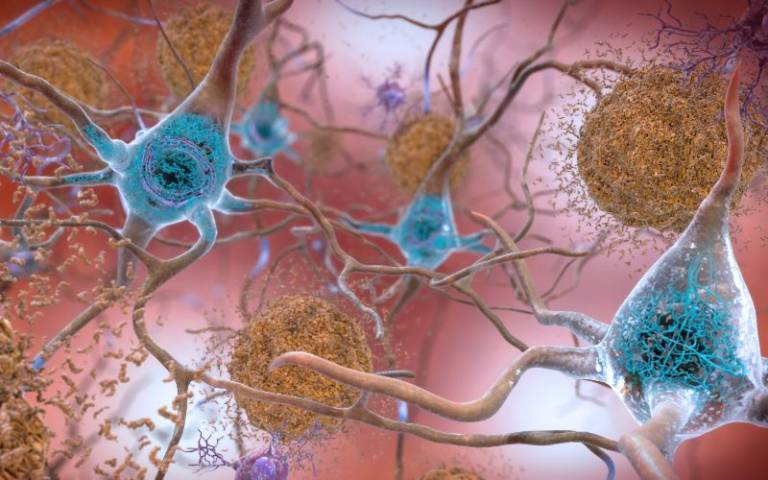Study finds 15 proteins newly linked to dementia risk
4 August 2021
A study by an international research group co-led by UCL researchers has identified 15 novel biomarkers that are linked to late-onset dementias.

These biomarkers are proteins, which predict cognitive decline and subsequent increased risk of dementia already 20 years before the disease onset.
The proteins are related to immune system dysfunction, blood-brain-barrier dysfunction, vascular (blood vessel) pathologies, and central insulin resistance. Six of these proteins can be modified with currently available medications prescribed for conditions other than dementia.
Lead author Dr Joni Lindbohm (UCL Epidemiology & Public Health and University of Helsinki) said: “These findings provide novel avenues for further studies to examine whether drugs targeting these proteins could prevent or delay the development of dementia.”
The results of the study have been published in the Alzheimer’s & Dementia: The Journal of the Alzheimer's Association.
Amyloid beta and tau proteins have dominated pathophysiological research on what causes dementia, but to date prevention and treatment trials targeting these biomarkers have been unsuccessful. This has motivated researchers to search for other potential mechanisms that could predispose to dementia. Recent development of scalable platforms has made it possible to analyse a wide range of circulating proteins, which may reveal novel biological processes linked to dementias.
In this study the authors were able to analyse proteins with a novel large-scale protein panel from stored blood samples of the UK-based Whitehall II and US-based Atherosclerosis Risk in Communities (ARIC) studies collected 20 years ago. Using a panel of 5,000 proteins measured from plasma, the researchers identified proteins that predicted cognitive decline in five-yearly screenings and subsequent onset of clinical dementia. The 15 proteins predicted dementia in both the UK and US cohorts.
Senior author and Director of the Whitehall II study, Professor Mika Kivimäki (UCL Epidemiology & Public Health) said: “This new study is the first step in our five-year Wellcome Trust funded research programme. We will next examine whether the identified proteins have a causal association with dementia, and whether they are likely to be modifiable, and druggable.”
The ultimate aim of the research programme is to identify novel drug targets for dementia prevention.
The international team, involving academics from the UCL faculties of Population Health Sciences and Brain Sciences, included scientists from the UK, Finland, Sweden, US, and France.
Links
- Research paper in Alzheimer’s & Dementia: The Journal of the Alzheimer's Association
- Professor Mika Kivimaki’s academic profile
- UCL Epidemiology & Public Health
- Whitehall II study
Source
Images
- The two brain proteins previously known to play major roles in dementia diseases: beta-amyloid plaques (seen in brown) and tau (seen in blue) in the brain. Credit: National Institute on Aging, NIH, on Flickr
Media contact
Chris Lane
Tel: +44 (0)20 7679 9222
Email: chris.lane [at] ucl.ac.uk
 Close
Close

